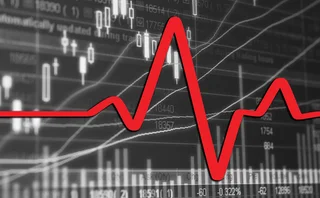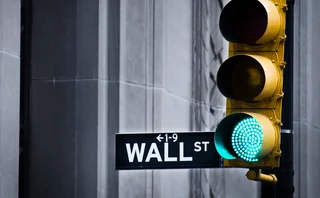
Bank CDS spreads tighten
The cost of credit protection on European banks narrowed this morning, as market sentiment rebounded after last week’s equity market plunge.
HSBC, which, like Barclays, declined an offer of government capital earlier this month, saw its CDSs fall to 94bp this morning from 99.7bp yesterday, according to credit information specialist CMA DataVision.
CDSs on Royal Bank of Scotland, which participated in the UK government’s liquidity scheme, also decreased this morning to 117.3bp from 119.2bp last night. The cost of credit protection on Lloyds TSB, which is set to take over HBOS, tightened to 75.8bp from 80bp.
Across Europe, many banks and non-financial institutions saw spreads tighten. German banking giant Deutsche Bank's CDSs fell from 155bp last night to 149.9bp this morning. UBS, which will clear its illiquid assets under an agreement with the Swiss government, saw its CDS spreads tighten to 138bp from 140.8bp yesterday.
French bank Crédit Agricole, one of six banks to receive an injection of capital from the government last week, saw its CDS spreads fall to 69.8bp this morning from 75bp last night. Conversely, the cost of credit protection on Société Générale rose from 95bp last night to 101.3bp this morning, amid rumours the bank has exposure to losses incurred from a dramatic climb in share prices of Volkswagen, the German car manufacturer.
CDSs on Hague-based insurer Aegon, which agreed to an indirect government injection of €3 billion yesterday, tightened 12.5bp this morning to 277.5bp.
European stock markets continued to fare well this morning after making gains yesterday. As of 1130 BST, the UK’s FTSE 100 index had risen by 5.28% to 4133.59, France’s Cac 40 index had jumped by 6.74% to 3324.87, while Germany’s Dax index, which finished up 11.28% last night, had suffered a mild loss of 0.07%, down to 4820.22.
In the US, former investment banks Morgan Stanley and Goldman Sachs, which are also rumoured to have exposure to losses from Volkswagen, saw their CDSs widen yesterday despite their shares rallying in afternoon trading. The cost of credit protection on Morgan Stanley climbed 20bp to 433.8bp last night. CDSs on Goldman Sachs rose to 322.9bp yesterday from 309.6bp the day before.
Elsewhere, there was neglible movement on bank credit spreads, with CDSs on Citigroup, Wachovia, Bank of America, JP Morgan Chase, and Wells Fargo moving less than 1bp either way. The only other rise in the cost of credit protection was on Merrill Lynch, recently acquired by Bank of America, whose CDSs rose to 219.2bp from 214.6bp on Monday.
The cost of credit protection on insurance giant AIG fell to 2280.6bp last night, from 2325.3bp the previous day. In contrast, CDSs on XL Capital increased to 954.8bp yesterday from 936.6bp the day before, despite news that the US Treasury is considering allowing non-financial institutions to access the Troubled Assets Relief Program.
Yesterday saw dramatic increases in the US stock markets, with the Dow Jones Industrial Average climbing 10.88% to 9065.12 yesterday, matched by the S&P 500 index rising 10.79% to 940.51.
In the sovereign markets, CDS spreads referencing Pakistan narrowed to 3270bp at 0950 BST, down from 5105.7bp on Monday. The country is in talks with the International Monetary Fund over a loan of between $10 and $15 billion to stabilise its economy. In the meantime, Pakistan’s probability of default over five years currently stands at 89.8%.
See also: CDS spreads tighten as markets recover
Only users who have a paid subscription or are part of a corporate subscription are able to print or copy content.
To access these options, along with all other subscription benefits, please contact info@risk.net or view our subscription options here: http://subscriptions.risk.net/subscribe
You are currently unable to print this content. Please contact info@risk.net to find out more.
You are currently unable to copy this content. Please contact info@risk.net to find out more.
Copyright Infopro Digital Limited. All rights reserved.
As outlined in our terms and conditions, https://www.infopro-digital.com/terms-and-conditions/subscriptions/ (point 2.4), printing is limited to a single copy.
If you would like to purchase additional rights please email info@risk.net
Copyright Infopro Digital Limited. All rights reserved.
You may share this content using our article tools. As outlined in our terms and conditions, https://www.infopro-digital.com/terms-and-conditions/subscriptions/ (clause 2.4), an Authorised User may only make one copy of the materials for their own personal use. You must also comply with the restrictions in clause 2.5.
If you would like to purchase additional rights please email info@risk.net
More on Credit markets
Liquidnet sees electronic future for grey bond trading
TP Icap’s grey market bond trading unit has more than doubled transactions in the first quarter of 2024
Single-name CDS trading bounces back
Volumes are up as Covid-driven support fuels opportunity for traders and investors
Podcast: Richard Martin on improving credit migration models
Star quant proposes a new model for predicting changes in bond ratings
CME to pass on Ice CDS administration charges
Clearing house to hike CDS index trade fees from July after Ice’s determinations committee takeover
Buy side fuels boom in single-name CDS clearing
Ice single-name CDS volumes double year on year following switch to semi-annual rolls
Ice to clear single-name bank CDSs from April 10
US participants will be able to start clearing CDSs referencing Ice clearing members
iHeart CDS saga sparks debate over credit rules
Trigger decision highlights product's weaknesses, warns Milbank’s Williams
TLAC-driven CDS index change tipped for September
UK and Swiss bank Holdco CDSs likely inclusions in next iTraxx index roll, say strategists







